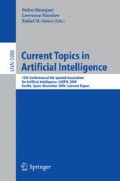Abstract
Case-based reasoning has demonstrated to be a suitable similarity-based approach to develop decision-support system in different domains. However, in certain scenarios CBR finds difficulties to obtain a reliable solution when retrieved cases are highly similar. For example, patients from an Intensive Care Unit are critical patients in which slight variations of monitored parameters have a deep impact on the patient severity evaluation. In this scenario, it seems necessary to extend the system outcome in order to indicate the reliance of the solution obtained. Main efforts in the literature for CBR evaluation focus on case retrieval (i.e. similarity) or a retrospective analysis. However, these approaches do not seem to suffice when cases are very close. To this end, we propose three techniques to obtain a reliance solution degree, one based on case retrieval and two based on case adaptation. We also show the capacities of this proposal in a medical problem.
This study was partially financed by the Spanish MEC through projects TIN2006-15460-C04-01, PET2007_0033, the SENECA 08853/PI/08, and the Excellence Project P07-SEJ-03214.
Access this chapter
Tax calculation will be finalised at checkout
Purchases are for personal use only
Preview
Unable to display preview. Download preview PDF.
References
Aamodt, A., Plaza, E.: Case-based reasoning: Foundational issues, methodological variations, and system approaches. AI Communications 7(1), 39–59 (1994)
Aha, D.W., Breslow, L.A.: Refining conversational case libraries. In: Leake, D.B., Plaza, E. (eds.) ICCBR 1997. LNCS, vol. 1266, pp. 267–278. Springer, Heidelberg (1997)
Bogaerts, S., Leake, D.B.: What evaluation criteria are right for CCBR? considering rank quality. In: Roth-Berghofer, T.R., Göker, M.H., Güvenir, H.A. (eds.) ECCBR 2006. LNCS (LNAI), vol. 4106, pp. 385–399. Springer, Heidelberg (2006)
Gupta, K.M., Aha, D.W., Sandhu, N.: Exploiting taxonomic and causal relations in conversational case retrieval. In: Craw, S., Preece, A.D. (eds.) ECCBR 2002. LNCS (LNAI), vol. 2416, pp. 133–147. Springer, Heidelberg (2002)
Huellermeier, E.: Case-Based Approximate Reasoning. Springer, New York (2007)
Juárez, J.M., Campos, M., Palma, J., Marín, R.: Computing context-dependent temporal diagnosis in complex domains. Expert Systems with Applications 35(3), 991–1010 (2007)
Klir, G.J., Folger, T.A.: Fuzzy Sets, Uncertainty, and Information. Prentice-Hall, N.J. (1992)
Kohlmaier, A., Schmitt, S., Bergmann, R.: Evaluation of a similarity-based approach to customer-adaptive electronic sales dialogs. In: Empirical Evaluation of Adaptive Systems. Proceedings of the workshop held at the 8th International Conference on User Modelling, pp. 40–50 (2001)
Kolodner, J.L., Leake, D.B.: A Tutorial Introduction to Case-Based Reasoning, ch. 2, pp. 31–65. American Association for Artificial Intelligence (1996)
Koton, P.: Using experience in learning and problem solving. Technical Report, MIT/LCS/TR-441 (1989)
Leake, D.B.: CBR in Context: The Present and The Future, ch. 1, pp. 31–65. American Association for Artificial Intelligence (1996)
Palma, J., Juárez, J.M., Campos, M., Marín, R.: A fuzzy theory approach for temporal model-based diagnosis. Artificial Intelligence in Medicine 38, 197–218 (2006)
Watson, I.: Case-based reasoning is a methodology not a technology. Knowledge-Based Systems 12, 303–308 (1999)
Author information
Authors and Affiliations
Editor information
Editors and Affiliations
Rights and permissions
Copyright information
© 2010 Springer-Verlag Berlin Heidelberg
About this paper
Cite this paper
Juarez, J.M., Campos, M., Gomariz, A., Palma, J.T., Marín, R. (2010). CBR Outcome Evaluation for High Similar Cases: A Preliminary Approach. In: Meseguer, P., Mandow, L., Gasca, R.M. (eds) Current Topics in Artificial Intelligence. CAEPIA 2009. Lecture Notes in Computer Science(), vol 5988. Springer, Berlin, Heidelberg. https://doi.org/10.1007/978-3-642-14264-2_14
Download citation
DOI: https://doi.org/10.1007/978-3-642-14264-2_14
Publisher Name: Springer, Berlin, Heidelberg
Print ISBN: 978-3-642-14263-5
Online ISBN: 978-3-642-14264-2
eBook Packages: Computer ScienceComputer Science (R0)

